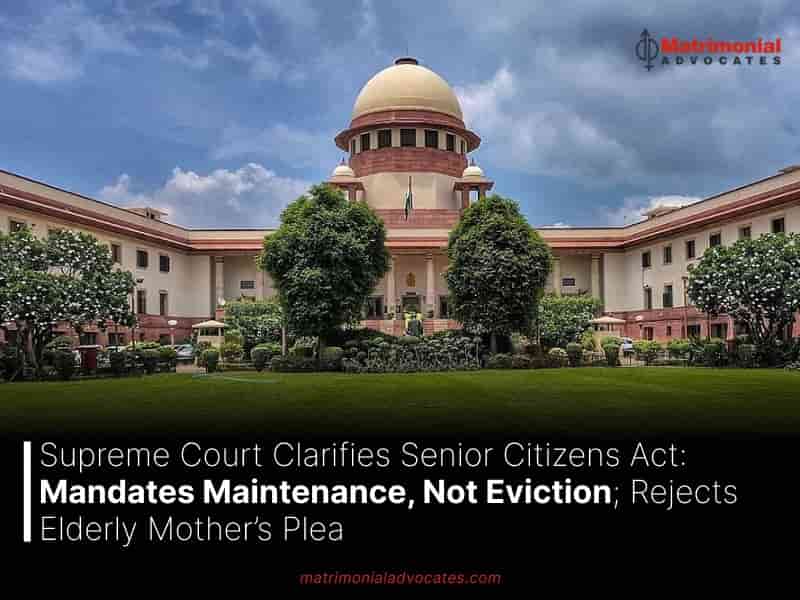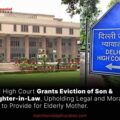
In a significant judgment balancing the rights of senior citizens with the legal protections available to family members, the Supreme Court of India has clarified that the Maintenance and Welfare of Parents and Senior Citizens Act, 2007 (Senior Citizens Act) mandates maintenance but does not automatically empower the eviction of children or relatives from residential properties, except in exceptional cases.
The verdict was pronounced in Civil Appeal No. __ of 2025 (arising from S.L.P. (C) No. 26651 of 2023) in the case of Samtola Devi v. State of Uttar Pradesh & Ors. In this matter, Samtola Devi, a 68-year-old mother from Sultanpur, U.P., sought the eviction of her eldest son, Krishna Kumar, from the family home, alleging harassment and lack of support.
A bench consisting of Justice Pankaj Mithal and Justice S.V.N. Bhatti dismissed the appeal on March 27, 2025, upholding the 2023 decision of the Allahabad High Court, which had nullified the eviction order issued by the Appellate Tribunal under the Senior Citizens Act.
Background of the Dispute
The case arises from a long-standing and deeply fractured family dispute. Kallu Mal, the late husband of Samtola Devi, owned House No. 778 in Khairabad, Sultanpur, which included three shops on the ground floor. The couple had three sons and two daughters. Over time, internal family conflicts intensified, particularly involving their eldest son, Krishna Kumar, whom his father accused of abuse and neglect.
In 2017, the elderly couple initiated maintenance proceedings under Section 125 of the CrPC. The Family Court directed their sons, Krishna Kumar and Janardan Kumar, to pay Rs. 4,000 per month each to both parents.
In 2019, citing continued harassment, the couple approached the Maintenance Tribunal under the Senior Citizens Act, seeking the eviction of Krishna Kumar. However, the Tribunal allowed him to remain in a single room with an attached bathroom and to continue operating his utensil business from one of the shops, with the condition that eviction proceedings could be initiated if he harassed his parents.
Dissatisfied with the decision, the couple filed an appeal. The Appellate Tribunal (District Magistrate, Sultanpur) overturned the earlier order and directed the eviction of Krishna Kumar. In response, Krishna Kumar challenged this ruling before the Allahabad High Court, which partially allowed his writ petition (Writ-C No. 35884 of 2009), nullifying the eviction while maintaining the other conditions.
After the passing of Kallu Mal, Samtola Devi continued to pursue the case before the Supreme Court, seeking the complete eviction of her son.
Legal Arguments
Senior Advocate Pallav Shisodiya, appearing for the appellant, argued that the disputed property was the self-acquired asset of Kallu Mal, and therefore, Krishna Kumar had no legal right to reside there, especially given his history of abuse and neglect. He cited the Supreme Court’s judgment in Urmila Dixit v. Sunil Sharan Dixit & Ors. (2025) 2 SCC 787, to support the position that eviction under the Senior Citizens Act is warranted in such circumstances.
In contrast, Senior Advocate S.K. Saxena, representing Krishna Kumar, refuted these allegations, maintaining that his client had consistently supported his parents, adhered to the court’s maintenance order, and was legitimately residing in a single room with an attached bathroom while running the utensil business inherited from his father. He also pointed out that the property was the subject of ongoing civil litigation, as Krishna Kumar had filed suits seeking a 1/6th share of the house and disputing the validity of gift deeds executed in favor of his sisters and brother-in-law.
Supreme Court’s Observations & Ruling
The Supreme Court, while contemplating the unfortunate circumstances surrounding intra-family conflicts, made a heartfelt observation:
“In India we believe in ‘Vasudhaiva Kutumbakam’ – the earth is one family. However, today we are not even able to retain unity in the immediate family… We are on the brink of one person, one family.”
The Court observed that although Kallu Mal originally acquired the property in 1971, portions of it had since been transferred through gift deeds and sale deeds to his daughters, son-in-law, and even a third party (Amrita Singh). Furthermore, one of the shops had been gifted to his younger daughter, Anjali, who later leased it out.
Importantly, the Court noted that:
“If it is accepted that the house is self-acquired property of the father, and if he has already transferred it to his daughters and son-in-law, he ceases to be the owner. Hence, neither he nor the mother can claim eviction rights from the said property.”
The Court held that Sections 4 and 5 of the Senior Citizens Act primarily focus on providing maintenance rather than granting an absolute right to eviction. While eviction can be permitted in exceptional cases (as established in S. Vanitha v. Commissioner, Bengaluru Urban District, (2021) 15 SCC 730), it remains a discretionary power rather than a mandatory one.
The Court noted that there was no evidence indicating any recent harassment by Krishna Kumar following the 2019 Tribunal order. He had been consistently fulfilling his maintenance obligations and was occupying a small, non-intrusive portion of the house.
Therefore, the apex court concluded:
“There was no necessity for the extreme step of eviction. The purpose could be served by ensuring maintenance and restraining interference in the life of the senior citizen.”
Key Takeaways from the Judgment
The main purpose of the Senior Citizens Act is to secure maintenance rather than to impose the eviction of family members.
- Eviction can only be ordered in rare and well-substantiated cases where there is clear proof of harassment or a threat to the senior citizen.
- Issues related to ownership and property rights should be resolved independently through civil courts, as the Act does not override ongoing civil disputes.
- A child may have an “implied license” to reside in the parental home unless there is concrete evidence of abuse or harm.





